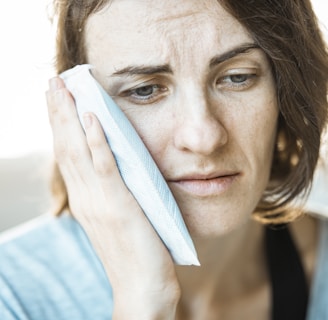Beyond the Smile: How Poor Oral Hygiene Can Seriously Impact Your Overall Health
We've all heard that we need to brush our teeth twice a day, but do you realize how crucial good oral hygiene is for your overall well-being? If you think cavities and bad breath are the only risks, prepare to be surprised! In this article, we'll explore the unexpected links between your mouth and the rest of your body, and give you practical tips for taking care of your oral health, no matter where you live.
HEALTHBLOG-LIST
9/9/20243 min read


Table of Contents
The mouth, gateway to your body
The unexpected consequences of poor oral hygiene
Cardiovascular diseases
Diabetes
Complications during pregnancy
Respiratory problems
Mental health
Simple tips for a healthy mouth
FAQ - Your frequently asked questions about oral hygiene
The mouth, gateway to your body
Your mouth is much more than just a tool for eating and speaking. It's a complex ecosystem where billions of bacteria live. Most are harmless, even beneficial, but poor hygiene can give harmful bacteria free rein.
These bacteria can then spread throughout your body through the bloodstream, causing problems far beyond your mouth. That's why it's essential to take care of your oral health, not only for a bright smile, but also for your overall health.
The unexpected consequences of poor oral hygiene
You may think that problems with your teeth and gums are limited to your mouth. Think again! Poor oral hygiene can have surprising repercussions on your overall health.
1. Cardiovascular diseases
Studies have shown a link between periodontal disease (gum infections) and an increased risk of heart disease. Oral bacteria can enter the bloodstream and contribute to inflammation of the blood vessels, increasing the risk of atherosclerosis (plaque buildup in the arteries), heart attack, and stroke.
2. Diabetes
Diabetes and periodontal disease have a two-way relationship. On the one hand, people with diabetes are more likely to develop gum problems. On the other hand, poor oral health can make it more difficult to control blood sugar levels in people with diabetes.
3. Complications during pregnancy
Pregnant women need to be especially vigilant about oral hygiene. Hormonal changes can increase the risk of gingivitis (inflammation of the gums), and studies suggest that poor oral health may be associated with an increased risk of premature birth and low birth weight.
4. Respiratory problems
Oral bacteria can be inhaled into the lungs, contributing to respiratory infections, especially in people who already have lung problems such as chronic obstructive pulmonary disease (COPD) or pneumonia.
5. Mental health
Oral health can also have an impact on your psychological well-being. Dental problems or bad breath can affect your self-confidence and social interactions, contributing to anxiety and depression.
Simple tips for a healthy mouth
Don't panic! Taking care of your oral health is not complicated. Here are some simple tips to adopt on a daily basis:
Brush your teeth twice a day for two minutes, using a soft toothbrush and fluoride toothpaste.
Use dental floss or interdental brushes once a day to clean between your teeth.
See your dentist regularly for checkups and professional cleanings.
Eat a balanced diet, limiting sugary and acidic foods.
Avoid tobacco and alcohol, which can damage your teeth and gums.
FAQ - Your frequently asked questions about oral hygiene
What type of toothbrush should I use?
Choose a soft toothbrush with rounded bristles. Hard toothbrushes can damage your gums.
How often should I change my toothbrush?
About every three months, or as soon as the bristles are worn.
Is flossing really necessary?
Absolutely! Flossing allows you to reach the spaces between your teeth where your toothbrush can't go, removing plaque and food debris.
How do I know if I have periodontal disease?
Common signs include red, swollen, or easily bleeding gums, persistent bad breath, loose or shifting teeth. See your dentist if you notice these symptoms.
Is teeth whitening safe?
Teeth whitening can be safely performed under the supervision of your dentist. Avoid over-the-counter whitening products that can damage your teeth if misused.
Conclusion
Your oral health is much more important than you think. By taking care of your mouth, you're not only protecting your smile, but also your overall health. So don't wait any longer, adopt good oral hygiene today and enjoy a healthier and happier life!
